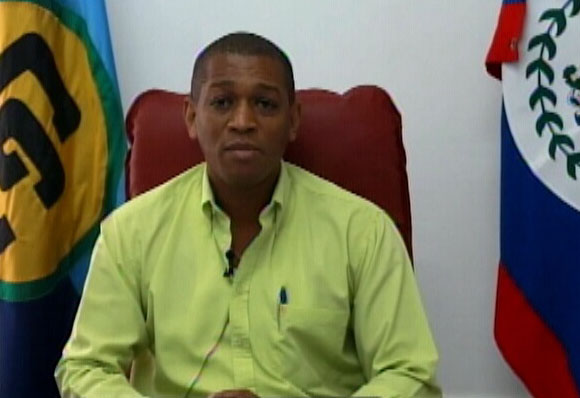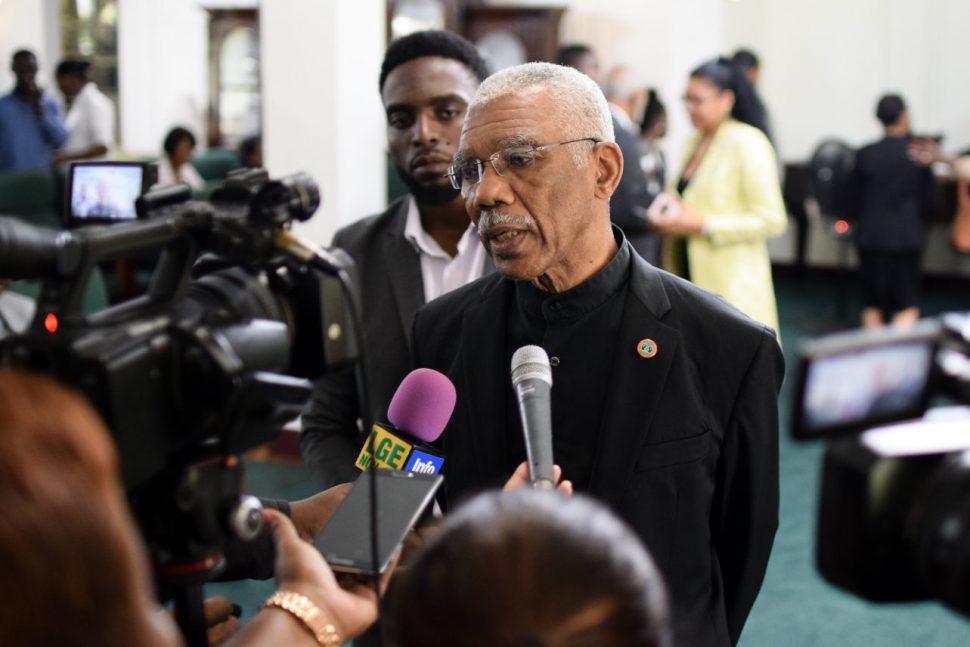Newly-appointed head of the Department of Energy (DoE) Dr. Mark Bynoe may not have experience in the oil and gas sector but he has the intelligence and ability to find the expert help needed, according to President David Granger.
Defending Bynoe’s appointment, Granger yesterday shrugged off concerns about his lack of experience, saying that he is confident that the new appointee could spearhead and complete a search for experts in oil and gas to support him when the DoE becomes functional by early next month.

“Well, we had been examining the state of the industry for the last seven months or so, since Cabinet had considered the recommendation by (the) Minister of Natural Resources that petroleum be transferred from that ministry. We had been searching and we decided on a person, who is experienced not necessarily in petroleum, but who has the intelligence and the experience to find the people who are experienced and who could administer that important industry,” he told reporters following the handing over of a report at State House.
“He knows he doesn’t know everything, but he knows where to find people who know enough to make that sector functional and we feel he is a fit and proper person to do that. No other person has been appointed. He has the responsibility to now embark on what I would call a four-phased programme for the establishment of the department,” he added.
Bynoe’s appointment took effect from August 1st, 2018 but his lack of experience in the oil and gas sector has raised questions about his suitability to hold the post.
The APNU+AFC government has been heavily criticised for not hiring experts to oversee the negotiations with ExxonMobil’s local subsidiary, Esso Exploration and Production Guyana Limited, in 2016 for the controversial Production Sharing Agreement, which many analysts have said has left Guyana with far less than it should be receiving when oil production begins in 2020.
Minister of Natural Resources Raphael Trotman, who was responsible for the petroleum sector, gave up those responsibilities earlier this year and announced that the DoE would be formed, while saying he believed that the President should be able to shape the vision for oil and gas.
Sources within government told this newspaper that Bynoe was handpicked by Granger and that even the five ministers the president had delegated to overlook the sector in the absence of the DoE “were left in shock” when he introduced Bynoe to them last week.
“He is His Excellency’s choice and no one else had a say in that matter…I can’t answer you as to if the vacancy was advertised or not but I do know that applications were received by some individuals and they were being looked at. It came as quite a shock and, as far as I am aware, the ministers were left in shock when they were told this is the chosen man,” one source said.
According to former Presidential Advisor on Petroleum Jan Mangal, the requirements for the person to head such an integral institution were laid out in a plan that had been compiled during his tenure and which was discussed as recently as March of this year. That plan included that the vacancy be advertised globally so as to get the best person. “The head of the new Department of Energy, per the plan from March, was to be someone with international gravitas, someone who could challenge the likes of [former US Secretary of State and former Head of ExxonMobil] Rex Tillerson, for example, who was comfortable talking [oil and gas] with Ministers from the major producing countries and the top executives from the major oil companies,” Mangal stated on Tuesday, after learning of the appointment.
“Some of the qualifications were: High level ministerial experience in natural resources, Executive level experience with a major oil and gas company (such as Shell, Exxon, Chevron, BP, etc). Hence the candidates were to be former Ministers or Vice-Ministers from major oil producing countries who also spent time in industry at the executive level. The objective was to hire the best from around the world, and the intention was to advertise transparently in top international magazines (such as the Economist). It is unlikely any Guyanese would have fit the criteria, but that was accepted back in March,” he added.
Mangal believes that the new DoE is “the last chance Guyana has to make this oil business benefit the people of Guyana.” He said that the Ministry of Natural Resources, under the leadership of Trotman “forfeited three years and almost every decision taken by the Ministry favoured the oil company and did not favour the people of Guyana.”
“The new Department of Energy was meant to remedy the situation, but it is baffling why the appointment of the first and top position did not follow the plan from March,” Mangal said.
Cover much ground
Granger did not explain the shift in plans but said that it will be gazetted that the Ministry of Natural Resources’ responsibilities for the sector has been formally transferred to the DoE, which will fall under the Ministry of the Presidency.
He explained that government has a four-phase programme for the department’s establishment, which Bynoe was expected to execute from yesterday. “First of all, we are looking at administration; the first phase in which he would assemble a team of people to work in the department. Secondly, we have to approach the issue of rationalisation. There is a petroleum Unit in the Ministry of Natural Resources and there may be other persons in the government of Guyana right now who have experience in that sector. So, some parts of some ministries may have to be transferred to the DOE, so we are going to look at that. All of this can be done simultaneously in a short matter of time,” Granger explained.
“Thirdly, we are looking at the operationalisation of the department and I expect by the beginning of September we will start with the implementation but a lot of work has to be done. We have to advertise for experts all over the world and we have to look at drafting legislation. We have to look at financing. We have to look at all other aspects of the operationalisation of the department. So, it is early days yet, but we hope that during the month of August we’ll cover much more ground, much more quickly than we have been able to do over the last seven months. There are four phases. We hope these can be completed by the end of August,” he said. The President did not state what the fourth phase would be.
Bynoe is the Managing Director of the Georgetown-based Development Policy and Management Consultants firm.
On the company’s website, his listed qualifications include a PhD from the University of East Anglia in Economics (Environmental Economics). “He has wide ranging experience in development-, trade-, and environment-related issues and possesses strong analytical and quantitative skills. Specifically, he has been involved in a variety of socio-economic studies during the conduct of Environmental Impact Assessments, and assessing and economically quantifying climate change impacts,” the company’s website states.
“Furthermore, Dr. Bynoe has worked, in collaboration with Distinguished Professor Clive Thomas on assessing the Impact of Agricultural Trade and Related Reforms on Domestic Food Security, looking at poverty indicators and nutritional statistics, among other things. He has published widely in reputable journals on issues of environmental economics, trade and environmental impact assessment,” it added.






